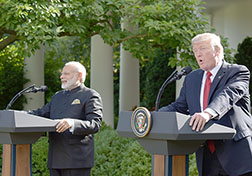
WASHINGTON - In a virtual endorsement of New Delhi's position on China's Belt-Road initiative, US and India have called for bolstering regional economic connectivity through the "transparent development of infrastructure while ensuring respect for sovereignty and territorial integrity". The joint statement "Prosperity Through Partnership" issued after a summit meeting between Prime Minister Narendra Modi and...

US President Donald Trump said the two leaders agreed that a close partnership between the United States and India is central to peace and stability in the Indo-Pacific region. The leaders agreed to take further measures to strengthen their partnership recognising the significant progress achieved in these endeavours.
Referring to the UN Charter, the two leaders expressed their commitment to a set of common principles for the region, "according to which sovereignty and international law are respected and every country can prosper."
"To this end, the leaders reiterate the importance of respecting freedom of navigation, overflight, and commerce throughout the region; call upon all nations to resolve territorial and maritime disputes peacefully and in accordance with international law."
The statement said that they support improving regional connectivity through use of responsible debt financing practices and called upon countries of the region to adhere to these principles.
It said the two countries "support bolstering regional economic connectivity through the transparent development of infrastructure and the use of responsible debt financing practices, while ensuring respect for sovereignty and territorial integrity, the rule of law, and the environment; and call on other nations in the region to adhere to these principles."
India opposes the China-Pakistan Economic Corridor, which is a part of China's ambitious One Belt One Road initiative (OBOR), as it passes through Pakistan-administered Kashmir. India did not take part in Belt and Road Forum meeting held in Beijing in May, saying that connectivity projects must be pursued in a manner that respects sovereignty and territorial integrity.
Referring to the UN Charter, the two leaders expressed their commitment to a set of common principles for the region, "according to which sovereignty and international law are respected and every country can prosper."
"To this end, the leaders reiterate the importance of respecting freedom of navigation, overflight, and commerce throughout the region; call upon all nations to resolve territorial and maritime disputes peacefully and in accordance with international law."
The statement said that they support improving regional connectivity through use of responsible debt financing practices and called upon countries of the region to adhere to these principles.
It said the two countries "support bolstering regional economic connectivity through the transparent development of infrastructure and the use of responsible debt financing practices, while ensuring respect for sovereignty and territorial integrity, the rule of law, and the environment; and call on other nations in the region to adhere to these principles."
India opposes the China-Pakistan Economic Corridor, which is a part of China's ambitious One Belt One Road initiative (OBOR), as it passes through Pakistan-administered Kashmir. India did not take part in Belt and Road Forum meeting held in Beijing in May, saying that connectivity projects must be pursued in a manner that respects sovereignty and territorial integrity.

 RSS Feed
RSS Feed
